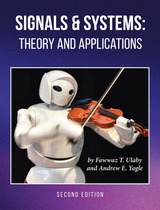4 books about Mahfouz, Naguib
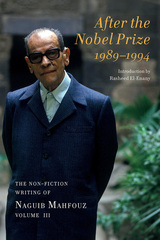
After the Nobel Prize 1989-1994
The Non-fiction Writing of Naguib Mahfouz, Volume IV
Naguib Mahfouz
Gingko, 2015
Naguib Mahfouz, the Arab world’s only Nobel literature laureate, is best known internationally for his short stories and novels, including The Cairo Trilogy. But in Egypt he was equally familiar to newspaper readers for the column he wrote for many years in the leading daily Al-Ahram, in which he reflected on issues of the day from domestic and international events, politics, and economics to historic anniversaries, inspirational personalities, and questions of cultural freedom. This volume brings together the 285 articles he wrote between January 1989 and the near-fatal knife attack in October 1994.
In carefully crafted short texts, his social conscience is revealed as he highlights political shortcomings, economic injustice, and corruption in Egypt and the wider Arab world. His philosophical sensitivity comes to the fore as he contemplates the meaning of a historic events, contributions of an influential people, and what is required to lead a good life. The collapse of the Soviet Union, the Oslo peace accords, the spread of terrorism, the Cairo earthquake, the passing of Louis Awad, Yusuf Idris, Yahya Hakki, the third term of Hosni Mubarak, climate change, and more come under Naguib Mahfouz’s fine scrutiny. For any fan of Mahfouz’s fiction, this collection opens a window on a different side of his intellect, and it offers insights from one of the region’s greatest modern minds.
In carefully crafted short texts, his social conscience is revealed as he highlights political shortcomings, economic injustice, and corruption in Egypt and the wider Arab world. His philosophical sensitivity comes to the fore as he contemplates the meaning of a historic events, contributions of an influential people, and what is required to lead a good life. The collapse of the Soviet Union, the Oslo peace accords, the spread of terrorism, the Cairo earthquake, the passing of Louis Awad, Yusuf Idris, Yahya Hakki, the third term of Hosni Mubarak, climate change, and more come under Naguib Mahfouz’s fine scrutiny. For any fan of Mahfouz’s fiction, this collection opens a window on a different side of his intellect, and it offers insights from one of the region’s greatest modern minds.
[more]
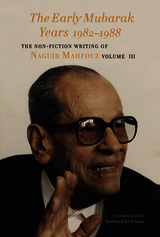
The Early Mubarak Years 1982–1988
The Non-Fiction Writing of Naguib Mahfouz, Volume III
Naguib Mahfouz
Gingko, 2020
In these essays Naguib Mahfouz comments on Egyptian politics, the role of Parliament, and the institutional changes that took place in Egypt after Honsi Mubarak became President in 1981.
[more]
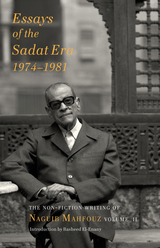
Essays of the Sadat Era
The Non-fiction Writing of Naguib Mahfouz: Volume II
Naguib Mahfouz
Gingko, 2015
When Naguib Mahfouz quit his job as a civil servant in 1971, a Nobel Prize in literature was still off on the horizon, as was his global recognition as the central figure of Arab literature. He was just beginning his post on the editorial staff of the Egyptian newspaper Al-Ahram, and elsewhere in Cairo, Anwar Sadat was just beginning his hugely transformative Egyptian presidency, which would span eleven years and come to be known as the Sadat era. This book offers English-language readers the first glimpse of the Sadat era through Mahfouz’s eyes, a collection of pieces that captures one of Egypt’s most important decades in the prose of one of the Middle East’s most important writers.
This volume stitches together a fascinating and vivid account of the dramatic events of Sadat’s era, from his break with the Soviet Union to the Yom Kippur War with Israel and eventual peace accord and up to his assassination by Islamic extremists in 1981. Through this tumultuous history, Mahfouz takes on a diverse array of political topics—including socioeconomic stratification, democracy and dictatorship, and Islam and extremism—which are still of crucial relevance to Egypt today. Clear-eyed and direct, the works illuminate Mahfouz’s personal and political convictions that were more often hidden in his novels, enriching his better-known corpus with social, political, and ideological context.
These writings are a rare treasure, a story of a time of tremendous social and political change in the Middle East told by one if its most iconic authors.
This volume stitches together a fascinating and vivid account of the dramatic events of Sadat’s era, from his break with the Soviet Union to the Yom Kippur War with Israel and eventual peace accord and up to his assassination by Islamic extremists in 1981. Through this tumultuous history, Mahfouz takes on a diverse array of political topics—including socioeconomic stratification, democracy and dictatorship, and Islam and extremism—which are still of crucial relevance to Egypt today. Clear-eyed and direct, the works illuminate Mahfouz’s personal and political convictions that were more often hidden in his novels, enriching his better-known corpus with social, political, and ideological context.
These writings are a rare treasure, a story of a time of tremendous social and political change in the Middle East told by one if its most iconic authors.
[more]
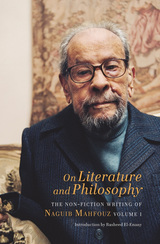
On Literature and Philosophy
The Non-Fiction Writing of Naguib Mahfouz: Volume 1
Naguib Mahfouz
Gingko, 2015
Naguib Mahfouz is one of the most important writers in contemporary Arabic literature. Winner of the Nobel Prize in 1988 (the only Arab writer to win the prize thus far), his novels helped bring Arabic literature onto the international stage. Far fewer people know his nonfiction works, however—a gap that this book fills. Bringing together Mahfouz’s early nonfiction writings (most penned during the 1930s) which have not previously been available in English, this volume offers a rare glimpse into the early development of the renowned author.
As these pieces show, Mahfouz was deeply interested in literature and philosophy, and his early writings engage with the origins of philosophy, its development and place in the history of thought, as well its meaning writ large. In his literary essays, he discusses a wide range of authors, from Anton Chekov to his own Arab contemporaries like Taha Hussein. He also ventures into a host of important contemporary issues, including science and modernity, the growing movement for women’s rights in the Arab world, and emerging ideologies like socialism—all of which outline the growing challenges to traditional modes of living that we saw all around him.
Together, these essays offer a fascinating window not just into the mind of Mahfouz himself but the changing landscape of Egypt during that time, from the development of Islam to the struggles between tradition, modernity, and the influences of the West.
As these pieces show, Mahfouz was deeply interested in literature and philosophy, and his early writings engage with the origins of philosophy, its development and place in the history of thought, as well its meaning writ large. In his literary essays, he discusses a wide range of authors, from Anton Chekov to his own Arab contemporaries like Taha Hussein. He also ventures into a host of important contemporary issues, including science and modernity, the growing movement for women’s rights in the Arab world, and emerging ideologies like socialism—all of which outline the growing challenges to traditional modes of living that we saw all around him.
Together, these essays offer a fascinating window not just into the mind of Mahfouz himself but the changing landscape of Egypt during that time, from the development of Islam to the struggles between tradition, modernity, and the influences of the West.
[more]
READERS
Browse our collection.
PUBLISHERS
See BiblioVault's publisher services.
STUDENT SERVICES
Files for college accessibility offices.
UChicago Accessibility Resources
home | accessibility | search | about | contact us
BiblioVault ® 2001 - 2024
The University of Chicago Press




